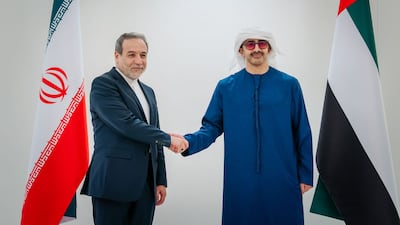Sheikh Abdullah bin Zayed, Deputy Prime Minister and Minister of Foreign Affairs, held talks with Abbas Araghchi, Iran's Minister of Foreign Affairs, in Abu Dhabi on Monday aimed at bolstering ties between the nations and supporting efforts to maintain regional stability.
Sheikh Abdullah and Mr Araghchi discussed the importance of talks between the US and Iran in strengthening security and preserving international peace.
The US and Iran were involved in a fourth round of indirect negotiations over Tehran's nuclear programme in Oman on Sunday, which were described as “difficult but useful” by Iran's Foreign Ministry and “encouraging” by US special envoy Steve Witkoff.
Washington has insisted that Iran stop enrichment to prevent it developing nuclear weapons grade uranium, while Iran has stressed it has no such aim and does not intend to end its programme.
The discussions are the highest-level contact between the two countries since Washington withdrew in 2018 from a deal that sought to regulate Iran's nuclear activities.
The Iranian minister's visit to the Emirates came a day before the start of US President Donald Trump's four-day visit to the Gulf, which begins in Riyadh on Tuesday and will also take in Qatar and the UAE.
Mr Trump wants to advance talks that would curb Iran's nuclear programme.
Striking a friendlier tone than in past comments, he said Tehran was “very reasonable” in the negotiations.
“We want Iran to be wealthy and wonderful and happy and great, but they can't have nuclear weapons, very simple,” he said.
Sheikh Abdullah and his Iranian counterpart also reviewed bilateral ties and ways to deepen ties between the two countries.
The meeting was attended by Khalifa Al Marar, Minister of State, and Lana Zaki Nusseibeh, Assistant Foreign Minister for Political Affairs.
Dr Anwar Gargash, diplomatic adviser to President Sheikh Mohamed, spoke in March of the need for the UAE and other Arab states to seek common ground with Iran.
“From a 'glass half full' perspective, we can see that the areas of co-operation are way bigger than the areas of disagreement with Iran,” Dr Gargash told the Raisina Dialogue in New Delhi. “This is part of our dialogue with Tehran. We understand there are certain issues where we don’t see eye-to-eye but there are many more where we do. Let’s work on these areas.”
He noted that Iran’s policy shift towards creating strong regional relations is an encouraging development. “We must respect Iran’s decisions that are sovereign,” he said in the Indian capital. “At the same time, we believe that by creating the right environment, that in itself builds more confidence.”
What is the FNC?
The Federal National Council is one of five federal authorities established by the UAE constitution. It held its first session on December 2, 1972, a year to the day after Federation.
It has 40 members, eight of whom are women. The members represent the UAE population through each of the emirates. Abu Dhabi and Dubai have eight members each, Sharjah and Ras al Khaimah six, and Ajman, Fujairah and Umm Al Quwain have four.
They bring Emirati issues to the council for debate and put those concerns to ministers summoned for questioning.
The FNC’s main functions include passing, amending or rejecting federal draft laws, discussing international treaties and agreements, and offering recommendations on general subjects raised during sessions.
Federal draft laws must first pass through the FNC for recommendations when members can amend the laws to suit the needs of citizens. The draft laws are then forwarded to the Cabinet for consideration and approval.
Since 2006, half of the members have been elected by UAE citizens to serve four-year terms and the other half are appointed by the Ruler’s Courts of the seven emirates.
In the 2015 elections, 78 of the 252 candidates were women. Women also represented 48 per cent of all voters and 67 per cent of the voters were under the age of 40.
MEDIEVIL%20(1998)
%3Cp%3E%3Cstrong%3EDeveloper%3A%3C%2Fstrong%3E%20SCE%20Studio%20Cambridge%3Cbr%3E%3Cstrong%3EPublisher%3A%3C%2Fstrong%3E%20Sony%20Computer%20Entertainment%3Cbr%3E%3Cstrong%3EConsole%3A%3C%2Fstrong%3E%20PlayStation%2C%20PlayStation%204%20and%205%3Cbr%3E%3Cstrong%3ERating%3A%3C%2Fstrong%3E%203.5%2F5%3C%2Fp%3E%0A
BUNDESLIGA FIXTURES
(All games 4-3pm kick UAE time) Bayern Munich v Augsburg, Borussia Dortmund v Bayer Leverkusen, Hoffenheim v Hertha Berlin, Wolfsburg v Mainz , Eintracht Frankfurt v Freiburg, Union Berlin v RB Leipzig, Cologne v Schalke , Werder Bremen v Borussia Monchengladbach, Stuttgart v Arminia Bielefeld
Dengue%20fever%20symptoms
%3Cp%3EHigh%20fever%20(40%C2%B0C%2F104%C2%B0F)%3Cbr%3ESevere%20headache%3Cbr%3EPain%20behind%20the%20eyes%3Cbr%3EMuscle%20and%20joint%20pains%3Cbr%3ENausea%3Cbr%3EVomiting%3Cbr%3ESwollen%20glands%3Cbr%3ERash%26nbsp%3B%3C%2Fp%3E%0A
Results
5pm: Maiden (PA) Dh80,000 (Turf) 1,200m. Winner: Majd Al Megirat, Sam Hitchcott (jockey), Ahmed Al Shehhi (trainer)
5.30pm: Handicap (PA) Dh80,000 (T) 1,600m. Winner: Dassan Da, Patrick Cosgrave, Helal Al Alawi
6pm: Abu Dhabi Fillies Classic Prestige (PA) Dh110,000 (T) 1,400m. Winner: Heba Al Wathba, Richard Mullen, Jean de Roualle
6.30pm: Abu Dhabi Colts Classic Prestige (PA) Dh110,000 (T) 1,400m. Winner: Hameem, Adrie de Vries, Abdallah Al Hammadi
7pm: Wathba Stallions Cup Handicap (PA) Dh70,000 (T) 2,200m. Winner: Jawal Al Reef, Richard Mullen, Ahmed Al Mehairbi
Handicap (TB) Dh100,000 (T) 2,200m. Winner: Harbour Spirit, Adrie de Vries, Jaber Ramadhan.

